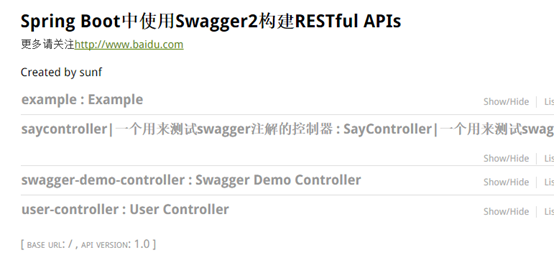创建Swagger2配置类
在Application.java同级创建Swagger2的配置类Swagger2
package com.swaggerTest;
import org.springframework.context.annotation.Bean;
import org.springframework.context.annotation.Configuration;
import springfox.documentation.builders.ApiInfoBuilder;
import springfox.documentation.builders.PathSelectors;
import springfox.documentation.builders.RequestHandlerSelectors;
import springfox.documentation.service.ApiInfo;
import springfox.documentation.spi.DocumentationType;
import springfox.documentation.spring.web.plugins.Docket;
import springfox.documentation.swagger2.
《一线大厂Java面试题解析+后端开发学习笔记+最新架构讲解视频+实战项目源码讲义》
【docs.qq.com/doc/DSmxTbFJ1cmN1R2dB】 完整内容开源分享
annotations.EnableSwagger2;
/**
-
Swagger2配置类
-
在与spring boot集成时,放在与Application.java同级的目录下。
-
通过@Configuration注解,让Spring来加载该类配置。
-
再通过@EnableSwagger2注解来启用Swagger2。
*/
@Configuration
@EnableSwagger2
public class Swagger2 {
/**
-
创建API应用
-
apiInfo() 增加API相关信息
-
通过select()函数返回一个ApiSelectorBuilder实例,用来控制哪些接口暴露给Swagger来展现,
-
本例采用指定扫描的包路径来定义指定要建立API的目录。
-
@return
*/
@Bean
public Docket createRestApi() {
return new Docket(DocumentationType.SWAGGER_2)
.apiInfo(apiInfo())
.select()
.apis(RequestHandlerSelectors.basePackage(“com.swaggerTest.controller”))
.paths(PathSelectors.any())
.build();
}
/**
-
创建该API的基本信息(这些基本信息会展现在文档页面中)
-
访问地址:http://项目实际地址/swagger-ui.html
-
@return
*/
private ApiInfo apiInfo() {
return new ApiInfoBuilder()
.title(“Spring Boot中使用Swagger2构建RESTful APIs”)
.description(“更多请关注http://www.baidu.com”)
.termsOfServiceUrl(“http://www.baidu.com”)
.contact(“sunf”)
.version(“1.0”)
.build();
}
}
通过createRestApi函数创建Docket的Bean之后,**apiInfo()**用来创建该Api的基本信息(这些基本信息会展现在文档页面中)。
Swagger使用的注解及其说明:
=====================
@Api:用在类上,说明该类的作用。
@ApiOperation:注解来给API增加方法说明。
@ApiImplicitParams : 用在方法上包含一组参数说明。
@ApiImplicitParam:用来注解来给方法入参增加说明。
@ApiResponses:用于表示一组响应
@ApiResponse:用在@ApiResponses中,一般用于表达一个错误的响应信息
l code:数字,例如400
l message:信息,例如"请求参数没填好"
l response:抛出异常的类
@ApiModel:描述一个Model的信息(一般用在请求参数无法使用@ApiImplicitParam注解进行描述的时候)
l @ApiModelProperty:描述一个model的属性
注意:@ApiImplicitParam的参数说明:
paramType:指定参数放在哪个地方 | header:请求参数放置于Request Header,使用@RequestHeader获取 query:请求参数放置于请求地址,使用@RequestParam获取 path:(用于restful接口)-->请求参数的获取:@PathVariable body:(不常用) form(不常用) |
name:参数名 |
|
dataType:参数类型 |
|
required:参数是否必须传 | true | false |
value:说明参数的意思 |
|
defaultValue:参数的默认值 |
|
案例1:
package com.swaggerTest.controller;
import org.springframework.stereotype.Controller;
import org.springframework.util.StringUtils;
import org.springframework.web.bind.annotation.RequestMapping;
import org.springframework.web.bind.annotation.RequestMethod;
import org.springframework.web.bind.annotation.RequestParam;
import org.springframework.web.bind.annotation.ResponseBody;
import io.swagger.annotations.Api;
import io.swagger.annotations.ApiImplicitParam;
import io.swagger.annotations.ApiImplicitParams;
import io.swagger.annotations.ApiOperation;
/**
-
一个用来测试swagger注解的控制器
-
注意@ApiImplicitParam的使用会影响程序运行,如果使用不当可能造成控制器收不到消息
-
@author SUNF
*/
@Controller
@RequestMapping("/say")
@Api(value = “SayController|一个用来测试swagger注解的控制器”)
public class SayController {
@ResponseBody
@RequestMapping(value ="/getUserName", method= RequestMethod.GET)
@ApiOperation(value=“根据用户编号获取用户姓名”, notes=“test: 仅1和2有正确返回”)
@ApiImplicitParam(paramType=“query”, name = “userNumber”, value = “用户编号”, required = true, dataType = “Integer”)
public String getUserName(@RequestParam Integer userNumber){
if(userNumber == 1){
return “张三丰”;
}
else if(userNumber == 2){
return “慕容复”;
}
else{
return “未知”;
}
}
@ResponseBody
@RequestMapping("/updatePassword")
@ApiOperation(value=“修改用户密码”, notes=“根据用户id修改密码”)
@ApiImplicitParams({
@ApiImplicitParam(paramType=“query”, name = “userId”, value = “用户ID”, required = true, dataType = “Integer”),
@ApiImplicitParam(paramType=“query”, name = “password”, value = “旧密码”, required = true, dataType = “String”),
@ApiImplicitParam(paramType=“query”, name = “newPassword”, value = “新密码”, required = true, dataType = “String”)
})
public String updatePassword(@RequestParam(value=“userId”) Integer userId, @RequestParam(value=“password”) String password,
@RequestParam(value=“newPassword”) String newPassword){
if(userId <= 0 || userId > 2){
return “未知的用户”;
}
if(StringUtils.isEmpty(password) || StringUtils.isEmpty(newPassword)){
return “密码不能为空”;
}
if(password.equals(newPassword)){
return “新旧密码不能相同”;
}
return “密码修改成功!”;
}
}
完成上述代码添加上,启动Spring Boot程序,访问:http://localhost:8080/swagger-ui.html
如上图,可以看到暴漏出来的控制器信息,点击进入可以看到详细信息。
两个注意点:
1. paramType会直接影响程序的运行期,如果paramType与方法参数获取使用的注解不一致,会直接影响到参数的接收。
例如:
























 769
769











 被折叠的 条评论
为什么被折叠?
被折叠的 条评论
为什么被折叠?








